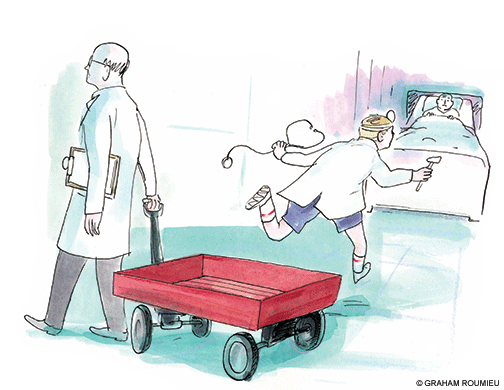
Are hospitals really more dangerous in July?
By Richard Besser | Watch the premiere episode of any TV drama set in a teaching hospital and you are likely to see one or two errors perpetrated by bright-eyed residents, physicians green to day-to-day hospital life. These eager newbies have yet to acquire the skills of their seasoned attendings, who rule the hospital with iron fists. By the end of the episode, the resident physician will have learned an important lesson in humility as older and wiser colleagues rush in to save the patient. The show closes with the resident determined to improve and earn the respect of his colleagues.
I remember the first week of my pediatric residency. After four years of hitting the books and working on the wards under the direction of licensed doctors, I finally had an MD after my name and was going to start caring for patients on my own! My best friend from medical school and I used to joke all the time that at some point someone was going to come up behind us, tap us on the shoulder, and call us out as the imposters we knew we were. “Excuse me, you are no doctor!” While that never happened, the early days of residency training are an incredibly stressful period in a young doctor’s life. A time when you are trying to act like you really know what you are doing, when in reality, you don’t even know how to log on to the computer.
While these are hard times for new doctors, what if you find yourself in the position of needing medical care in July, when fresh med-school graduates transition from the classroom to the hospital? Should you delay elective surgery? Should you avoid teaching hospitals? It is a question that a number of studies have sought to answer, and while media coverage has focused on those studies that show an increased risk, the research appears to fall on both sides of the fence.
One of the best reviews of this question was published in 2011 in the Annals of Internal Medicine. The authors reviewed 39 studies that looked into what has been called the “July Effect,” the impact on patients’ health of being in the hospital in July as compared to other times of the year. The studies came from several different countries, though most were from the United States. When looking at increased risk of death, half of the really good studies showed an increase and half did not. When it came to medical errors of various kinds, only five studies were felt to be of high quality, and only one of these showed an increased rate of errors. Lastly, they looked at how efficiently the hospital worked: things like length of stay, hospital charges, and how long operations took to complete. Here there were seven high-quality studies, and again there was a split, with about half showing problems in July and half not.
Why are there so many conflicting studies? There are a number of reasons. This is a really hard thing to study. There is no uniform approach to patient care across all hospitals, so a study looking at one hospital really only tells you something about that hospital. In addition the systems in place to capture medical errors are primitive and changing, so counting mistakes in many settings isn’t very accurate. A recent report by the Inspector General in the Department of Health and Human Services found that 86 percent of incidents involving harm to Medicare patients in hospitals went unreported. It is hard to measure small differences in how you are treated in the hospital in different months if most mistakes aren’t even recorded.
However, I do have a personal take on this issue. Early in my career, I spent five years as the pediatric residency director at the University of California, San Diego. During those years when I was in charge of the trainees, the period that concerned me the most wasn’t July—it was June. During July we watched the new interns and residents like hawks. They might have thought they were flying solo but they weren’t. We put the best senior doctors on the wards and double- and triple-checked the orders that were being written. In June it was entirely different. Residents were seasoned, they knew what they were doing, and our focus was on the upcoming transition. In June, some residents got a bit sloppy. Those who were leaving for jobs had their minds elsewhere. The interns who were just finishing up their first grueling year of training were exhausted and looking forward to no longer being the low ones on the totem pole.
Clearly, though, the message that the public receives about the “July Effect” skews in the more interesting of the two possible directions. A non-scientific review of media coverage of this phenomenon using a Google search revealed that popular news sites and other media sources were far more likely to report that this effect exists than they were to acknowledge research to the contrary. It may be that reading about what will kill us is much more interesting than finding out what is not likely to.
The data are mixed, but if anything can be shown, it is that while the month might make a bit of difference, it is not the primary determinant of your chances of making it out of the hospital alive. The important thing is that you get the care you need, whenever it is you may need it. Enter the hospital on your guard and follow my tips for hospital safety. This is a good idea no matter what month it is.
Top Ten Questions to Ask When You Are in the Hospital
1. Why is this test being done?
Before having any test, understand its purpose and find out how the results will affect your care. Especially if it is an invasive procedure, ask if there are any risks from the test itself and if there is another way to get the information needed.
2. What are the results of my tests?
If you had tests done, ask for the results and for someone to go over them with you so you understand them. Request a written copy of results to keep with your medical records.
3. Have you washed your hands?
Before anyone touches you ask, “Have you washed your hands?” It may be hard to do, but it could prevent a life-threatening infection.
4. Who will be taking care of me?
Your team can include the head doctor (also called an “attending”), fellows, residents, medical students, nurse practitioners, nurses, and nursing assistants. It can be very confusing. Ask for, or keep, a list of who is providing your care. Just like in baseball, it’s hard to keep track without a program!
5. When will my tubes be removed?
If you have any tubes coming into your body (IV, urinary catheter), ask when they can be taken out. This will reduce the chances that you will get an infection.
6. What are the medications I’m taking?
Ask for a list of all of the medications that they are going to be giving you and have the nurse tell you what each is for. Pain medicines, sleeping pills, and stool softeners are often prescribed on an “as needed” basis. You are in the driver’s seat as to whether you want these. The fewer medicines you take, the fewer side effects you will experience.
7. Who is performing my operation?
Before having surgery, ask who will be doing it and exactly what will be done. You have the right to know whether your surgery will be performed by the head of your medical team or a resident. If you aren’t comfortable with the answer, ask to speak to the head of the team.
8. Are there any support services for patients?
Many hospitals have integrative or complementary health departments that offer all kinds of programs, from bedside yoga to nutritional counseling, which can be a tremendous support to your emotional health.
9. Could you explain that again?
Some healthcare providers can forget that you may not have a medical degree! Medical terminology that seems obvious to someone working in a hospital is like a foreign language to most patients. Keep asking for things to be clarified if you don’t understand exactly what they mean.
10. When can I go home?
While a hospital is a great place to be when you need to be there, getting out as soon as you can is also important. Fewer days in the hospital means fewer days for you to pick up something you didn’t come in with.
Richard Besser M’86 is the chief health and medical editor for ABC News. Excerpted from the book TELL ME THE TRUTH, DOCTOR by Richard Besser, M.D. Copyright © 2013 Richard Besser, M.D. Published by Hyperion. Available wherever books are sold.




